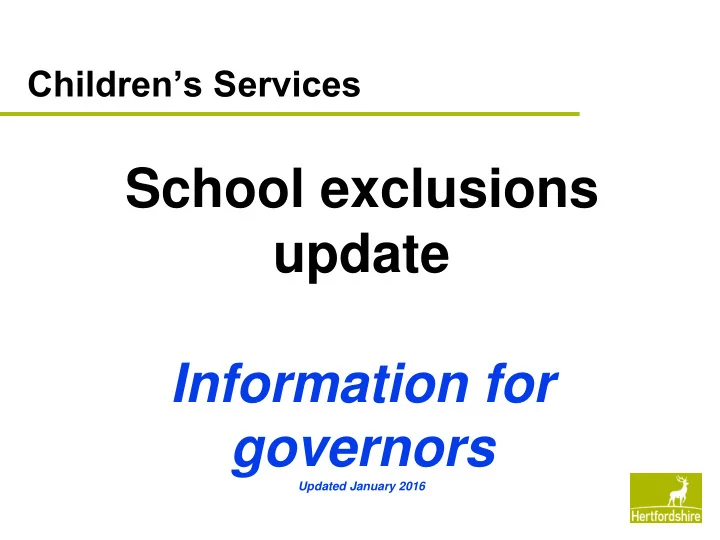

Children’s Services School exclusions update Information for governors Updated January 2016
PURPOSE To highlight key changes to the exclusion regulations implemented on 1/9/12 To inform governors regarding the new guidance from the DfE and HCC in relation to exclusions To provide a forum for discussion and questions
Guidance and legislation (1) DfE guidance: “ Exclusion from schools, Academies and pupil referral units in England. A guide for those with legal responsibilities in relation to exclusion ” Available at http://www.education.gov.uk/schools/pupilsupport/behaviour/exclu sions Replaces: “ Improving behaviour and attendance: guidance on exclusion from schools and Pupil Referral Units ” New guidance much slimmer Paragraph 5: “ Any decision of a school, including exclusion, must be made in line with the principles of administrative law, i.e. that it is lawful; rational, reasonable, fair and proportionate ”
Guidance and legislation (2) HCC guidance: “ Exclusion guidance supplement. September 2012 ” Available at http://www.thegrid.org.uk/info/welfare/exclusions.shtml Replaces: “ Exclusion guidance supplement. October 2011 ” The “missing manual” DfE guidance in normal typeface; HCC guidance in italics Must have regard to statutory DfE guidance HCC guidance highly recommended; IRP members aware of this and may use it as a guide themselves.
Small changes Governors may review Head Teacher’s decision to exclude sooner than the 6 th day after notification – not recommended by HCC Minutes of GDC hearings should be made available to all parties on request Standard letter no longer provided by DfE – suitable templates in appendix 7 of HCC guidance (downloadable on SIMS exclusion module)
The Independent Review Panel (1) Independent Appeal Panel (IAP) replaced by Independent Review Panel (IRP), which has different powers IRP cannot reinstate a child IRP has three options Uphold original decision Recommend governors reconsider their decision Quash governor’s decision and direct them to reconsider
The Independent Review Panel (2) If, having received a direction to reconsider its decision, the governing body does not reinstate within 10 school days the school/academy is liable to pay £4,000 to the LA towards the cost of alternative provision (referred to as a “readjustment” payment) In addition to the AWPU A penalty payment by any other name… Applies equally to primary as to secondary! Could this lead to more judicial reviews?
SEN expert at IRP hearings Parents have the right to request the presence of an SEN expert at an IRP hearing Applies whether or not the school/academy recognises the child has SEN SEN expert’s role is to provide impartial advice as to how SEN could be relevant to the exclusion Will not involve the SEN expert assessing the child! LA/academy trust pay for expenses and indemnifies the SEN expert.
Who may sit on an IRP panel? A lay member, who acts as chair who has not worked in a school in a paid capacity A school governor from a different area to the excluding school who has served as a governor for at least 12 consecutive months in the last five years (and who also not served as a Head Teacher during the last five years A Head Teacher or a person who has been a Head Teacher within the last five years from a different area to the excluding school
The role of the Local Authority (1) For maintained schools the governing body must invite the LA to GDC meetings and consider any representations made. The nature of these representations is not specified in the new guidance However, the LA will continue to act from a position of neutrality and not a give a view on the merits of the exclusion as the representative would see the case
The role of the Local Authority (2) The LA representative may make a statement in general terms, for example about how other schools in the area have dealt with similar incidents* may draw the panel’s attention to issues where there is a lack of clarity, or where more information may be needed, or where guidance appears to have been ignored. may assist the clerk in providing advice on procedure and on legal matters *HCC policy is that the LA representative will not venture such statement unless asked by either the panel or the parent(s)/carer(s)
The role of the Local Authority (3) For academies… No automatic right to attend GDC hearings LA may attend if parent requests this but only as an observer. The LA may only make representations with the governing body’s consent All secondary phase academies in Hertfordshire have indicated that they would wish the LA to be present at GDC hearings and to make representations The LA will adopt a position of neutrality as already described Position likely to be the same at IRP meetings
Training for governors (1) It is essential that all governors who review a Head Teacher’s decision to exclude a child have received adequate training within the previous two years to discharge this duty. Paragraph 116 of the DfE exclusion guidance stipulates this for IRP members and legal advice is that what applies to the IRP also applies to governing bodies
Training for governors (2) Be prepared! Don’t wait until there is an absolute need to have your governors exclusion trained because a child has been excluded. must be able to act impartially tight time scales have as many governors exclusion trained as possible You may not “borrow” trained governors from another school
What training is available? “Exclusions” covers the essentials qualifies a governor for two years to review a Head Teacher’s decision to exclude lasts two hours “Exclusions in Practice” need to have done the “Exclusions” course first an opportunity to rehearse role play and other activities lasts three hours Further details from Governance or Malcolm Leigh (Integration Manager), telephone number 01438 – 843375, e-mail malcolm.leigh@hertfordshire.gov.uk
Arranging training Contact Governance Hannah Stewart – telephone number 01438 – 844426, e-mail hannah.stewart@hertsforlearning.co.uk
Thank you
Recommend
More recommend